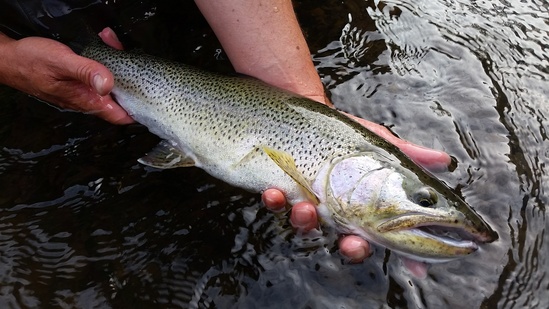
April 06, 2020
(Washington, DC) – Last week, the National Oceanic and Atmospheric Administration (NOAA) dedicated nearly $170,000 in funding to support four Coastal priority projects under the National Fish Habitat Partnership. These four projects will enhance recreational fisheries engagement and restore fish habitat. Saltwater recreational fishing is an American pastime and important economic driver, and anglers make critical contributions to the conservation of fish habitat nationwide. These projects demonstrate NOAA’s commitment to engaging with the recreational fishing community and supporting access to sustainable saltwater recreational opportunities. These funded projects reflect priorities of the following partnerships: (Atlantic Coastal Fish Habitat Partnership, Pacific Marine & Estuarine Partnership, Southeast Alaska Fish Habitat Partnership, and the Western Native Trout Initiative).
Oyster Reef Construction in Virginia – (Atlantic Coastal Fish Habitat Partnership)
Lynnhaven River Now will partner with the Chesapeake Bay Foundation and local anglers to construct an oyster reef in the eastern branch of the Lynnhaven River. The Lynnhaven River is one of five rivers in Virginia targeted for oyster habitat restoration as part of a larger plan in the Chesapeake Bay watershed. Recreationally and economically important fish species such as bluefish, summer flounder, and black sea bass use restored oyster reef habitats for shelter and food. Recreational anglers will provide input on oyster reef construction and configuration. The project’s outreach efforts will also build on the first Virginia Rod and Reef Slam held in 2019. At this fishing tournament, anglers aim to catch the largest diversity of species. A second Rod and Reef Slam scheduled to be held in Virginia in 2020 is anticipated to have increased participation. It will educate participants about the planned oyster restoration efforts in the Lynnhaven River. This project builds on two workshops NOAA held in the Chesapeake Bay region in 2019, where anglers identified critical priorities for oyster restoration activities.
Eelgrass Habitat Restoration in California – (Pacific Marine & Estuarine Partnership)
Through this project, the Orange County Coastkeeper will engage recreational anglers in eelgrass habitat restoration in Newport Bay, located in Newport Beach, California. Eelgrass provides essential habitat for recreationally fished species such as halibut, croaker, white sea bass, and barred sand bass. Recreational anglers will have the opportunity to support the project at several events by bundling and planting eelgrass in the bay. The Coastkeeper will also provide educational materials to anglers about eelgrass habitats, preventing turtle entanglements, and the overall importance of habitat conservation.
Stream Restoration for Salmon in Southeast Alaska - (SE Alaska Fish Habitat Partnership)
The Takshanuk Watershed Council will work with community members, subsistence fishers, and recreational anglers on this project. They will plant native vegetation along stream banks following the removal of two barriers to fish passage. The stream restoration will increase the amount of habitat available to salmon for spawning in Haines State Forest in Haines, Alaska. This project will restore critical salmon habitat in the Chillkat Valley, Alaska which is the top producer of sockeye and chum salmon in Southeast Alaska. Many Haines residents engage in subsistence fishing and they will be encouraged to participate in this project as volunteers. The volunteers involved in this project will also assist the Takshanuk Watershed Council with water quality monitoring. They will communicate project results and importance within the community.
Cutthroat Trout Habitat Restoration in Washington - (Western Native Trout Initiative)
The Hood Canal Salmon Enhancement Group and Coastal Cutthroat Coalition will collaborate on this project, which will take place on beaches and water throughout the Hood Canal in Washington. It will include outreach, collection of genetic data from coastal cutthroat trout, and river restoration. The groups will host outreach events for recreational anglers to increase the awareness and understanding of this less understood native trout species. These events will also promote future engagement opportunities for anglers to participate in genetic data collection. This will guide selection of habitat restoration sites for river bank plantings to restore important trout habitat. Each component of this project involves direct angler engagement and will result in improved local understanding of this native species and its important river habitat.
NOAA’s Office of Habitat Conservation and Recreational Fishing Initiative, are collaborating to fund these projects through existing agreements with the Atlantic and Pacific States Marine Fisheries Commissions. “We are grateful for this support for on-the-ground projects of our Fish Habitat Partnerships,” said Ed Schriever, Chair of the National Fish Habitat Board. “The funding of these projects is critical for our Fish Habitat Partnerships to meet their conservation objectives in priority habitat areas.”
NOAA news story, here: https://www.fisheries.noaa.gov/feature-story/coastal-projects-enhance-recreational-fishing-and-restore-habitat
About the National Fish Habitat Partnership:
Since 2006, the National Fish Habitat Partnership has supported 935 projects benefiting fish habitat in all 50 states. The partnership works to conserve fish habitat nationwide; leveraging federal, state, tribal, and private funding resources to achieve the greatest impact on fish populations through priority conservation projects of 20 regionally-based Fish Habitat Partnerships. The Association of Fish and Wildlife Agencies has supported the National Fish Habitat Partnership since its inception in 2006. For more information, visit:
http://fishhabitat.org/
http://www.facebook.com/NFHAP
https://twitter.com/FishHabitat

